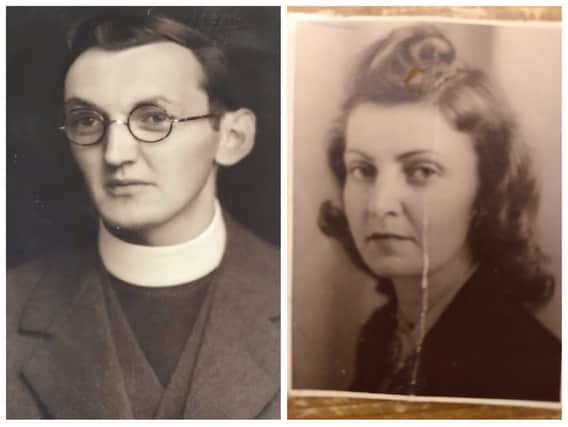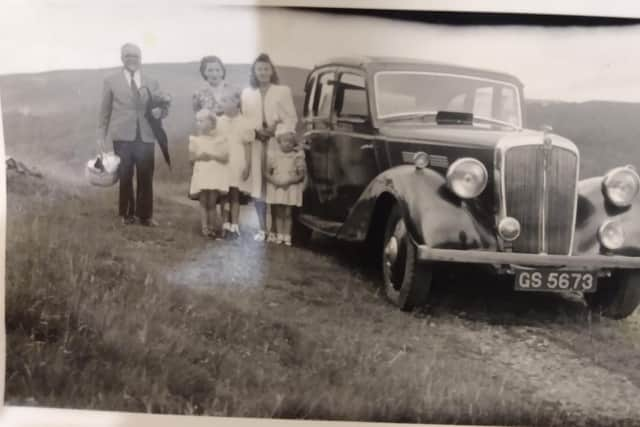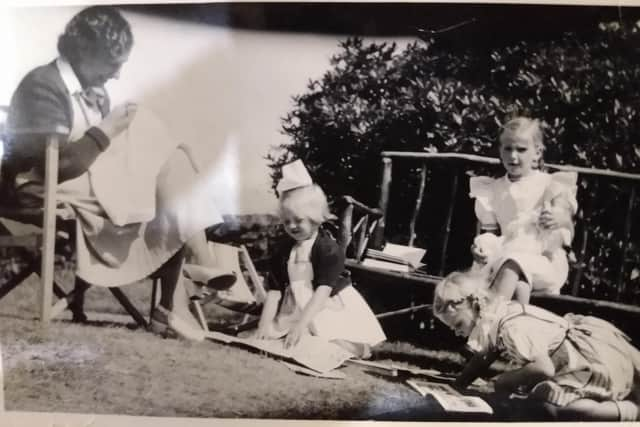The bigamy scandal that left a Highland church empty and a family torn apart


As a refugee from Estonia, she was more used to spending nights on train station floors and eating the most meagre of food in a camp in north Germany as the world shattered by war around her.
But at Foss in Perthshire, she got her childhood back as she walked in the wildflower meadows and listened to sweet lark song in the evening. At night, she slept soundly once again.
Advertisement
Hide AdAdvertisement
Hide AdShe said: “We were in a beautiful little valley with heather covered hills on one side and what is now Loch Tummel on the other. I was deliriously happy.”


But behind this new dreamy place lay adult-shaped problems as a scandal circled the new arrivals.
Astrid’s mother, Elsa, married the minister at Foss Kirk and was later accused of bigamy. The good Christians of the village spread gossip and hostility against the family from the Baltic. The locals made their feelings clear and stopped going to church - and the pews remained empty.
“That is what I really remember about the whole thing, just my mother and myself sitting in the church. Nobody else was there, ” said Astrid, now 79.
Astrid, whose married name is Wilson, has told her family story after Foss Kirk, where she spent part of her childhood, was put up for sale by the Church of Scotland, a new chapter in its long history set to begin.


The family’s journey to Perthshire started in a refugee camp in East Germany after the Russian tanks tightened their grip on Estonia in 1944.
There, Elsa mourned the loss of her husband Bruno, a medic, who was taken prisoner on the Russian front and put in a concentration camp, where executions were the norm.
With Bruno presumed dead, a ticket to a new life in Britain came with the Baltic Swan programme that offered women work as nurses in the UK. Elsa went ahead to England and took up a nursing post at Papworth Hospital in Cambridgeshire.
And then, a nice letter came.
Advertisement
Hide AdAdvertisement
Hide AdIt was written by William Gilles, a recently ordained Church of Scotland minister from Edinburgh, who had been Elsa’s pen pal since they were teenagers. Finally, through the fog of war, he found her again.
Elsa replied immediately and he visited her in England, with Elsa then taking a trip to Edinburgh. Soon, she received another letter to say he had been given a parish at Foss and would she come and visit him?
In her memoir, The Wings of A Dove, Elsa wrote: “I was very impressed with everything. Everything was so peaceful. The Highlands had not suffered from the war. I remember the first day of the holiday so clearly. The sun was shining.”
Soon a proposal followed and Astrid, her little sister Dagmar and Elsa’s father headed to Foss in late 1946. It felt as if nothing could harm them and on their first Christmas, William dressed up as Santa and also took the girls to a “posh shop” in Perth where they were told they could pick anything they wanted.
“As it happened, Dagmar and I were simply overcome and couldn't choose anything, in the same way that refugees, having been given a rich meal, become ill after eating it because they have been used to so little.” she said.
Then, Bruno emerged from the Russian concentration camp in 1947. He had been spared death and treated relatively well after performing an operation that saved the Camp Kommandant’s life.
Astrid said: "He tried to find his family – only to learn that my mother, not having heard from him for five years, was in the UK and had married again.”
An allegation of bigamy followed with a case lodged at a court in Lubek in the north of Germany.
Advertisement
Hide AdAdvertisement
Hide AdAstrid said: “This of course was bigamy, but not bigamy in its usual form. It was a common after the war and the courts usually declared that there were no guilty parties.
"My mother was asked to choose which husband she wanted to remain with. My mother chose William. She then had to divorce my father and go through a second wedding ceremony with William.
"The courts were fine with the situation and the Church of Scotland was, too. But there was a catch. The parishioners of Foss and Tummel were not so happy. They made their feelings clear. As an entire body they stopped attending church.”
The Kirk sent William away to Singapore with the Seaforth Highanders with his wife, now pregnant with her third child, and family staying on in Foss. The village closed ranks. On the night Elsa gave birth, she did so alone in the Manse, cutting the umbilical cord with a pair of scissors from the dressing table.
"My mother was a strong woman with a good job, not what people said about her – that she had latched on to William for “security” or to get UK citizenship.
“Later, one of the mothers said to me - 'She had a baby only to keep William and to stay in the UK.' A cruel thing to say to a child and not true,” she added.
The family reunited after WIlliams’ return from Singapore and they lived together at Redford Barracks in Edinburgh, but the whole episode cast a dark shadow over the family. Despite it all, Foss is still held fondly by Astrid.
Astrid said: "I am pleased to be part of its history. It meant so much to me as a child after those terrible times fleeing from the Russians. I have such good memories of it. I remember the sun slanting through the windows as William, standing in the pulpit, preached Sunday after Sunday.
Advertisement
Hide AdAdvertisement
Hide Ad“And then there was the wonderful walk back to the manse, with the singing of the larks and the beautiful flowers. Yes – it was paradise.”